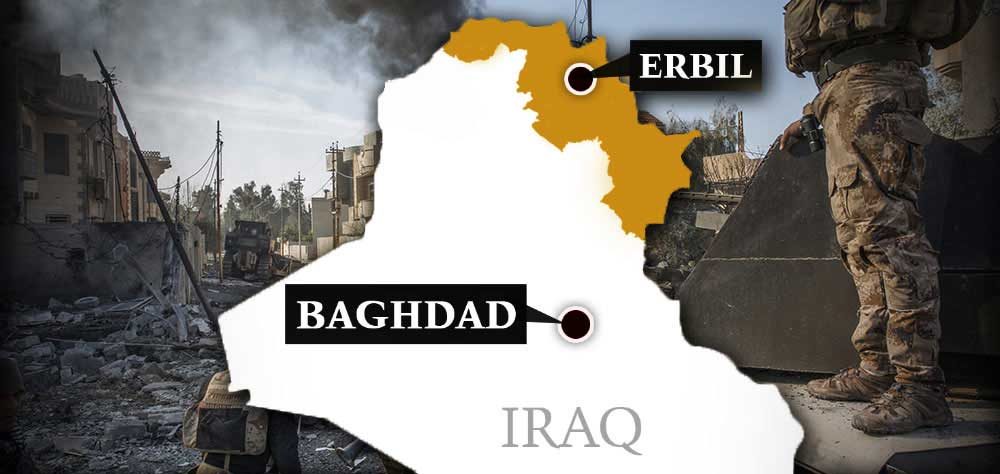The Kurds account for an overwhelming majority of the northern Iraqi region, however, the matter of independence also concerns a series of neighbors like Iran, Turkey, and Syria as they have Kurdish minorities as part of their population.
Reacting to the referendum-related efforts of the Kurdish region’s leaders, Iran and Turkey called the upcoming plebiscite a “big mistake.” This stance was revealed also during visit to Turkey of the Iranian military chief General Mohamad Bagheri who talked to the Turkish officials, stressing the point that the Iraqi sovereignty and political cohesion was one of the core tenets of the Tehran-Ankara policy in relation to the neighboring Iraq.
Amid sensitively volatile regional conditions, any referendum for a Kurdish state can bear adverse results by further destabilization of the already-messy situation in the region. This looks enough for the regional countries like Iran and Turkey to express to the Iraqi officials and also the international sides objection to any referendum bid of the Kurdistan Regional Government, telling them that such an effort will not work for the good of Iraq and even the Kurds themselves.
In mid-July, a delegation of the Patriotic Union of Kurdistan (PUK) visited the Iranian capital Tehran. Iranian officials reportedly received the Kurdish delegation in a friendly manner but took clear and firm stances on the idea of referendum for independence, triggering changes in the Kurdish approach and revision of attempts to hold the voting. The Iranian leaders advised the PUK officials that independence will primarily jeopardize the Kurdish region and eventually all sides’ security and interests.
The Turkish delegation then flew to Baghdad after Tehran trip, to make understanding of the central government’s postures after getting a clear picture of the Iranian position. The Iraqi officials came clean on the need for Kurdistan to stay within Iraq. And now the Kurds seem to have come up with the notion that going the way to independence while major regional actors are objecting can stir an internal fight between the central Iraqi government and them. Analysts argue that if the Kurds announce independence, a war is inevitable, in which in one side stand the Kurds alone and in the other side stand the Iraqi army and very likely a coalition of popular forces who are now busy combating the ISIS terrorist group in the country. Such a war is hard to escape if the Kurdish leaders continue to press forward with independence bid.
Why is a battle inescapable between central government and Kurdistan region in case of Kurdish independence?
1. Damage to Iraqi sovereignty and unity: Certainly, the main drive of Baghdad leaders to come tough against the independence bid is the will to save the now-endangered national sovereignty. For many decades, the colorful Iraqi ethno-sectarian structure has been cohesive despite a wide range of differences among various social walks. This makes resistance and reaction of the Iraqi people to the Kurdish-spearheaded split of the country unavoidable, and easy to predict.
2. “Disputed regions” challenge remains unsettled: The issue of disputed regions, addressed in the Iraqi constitution under the Article 140, remains an unresolved matter among the Iraqi political circles. The case has been representing a sticking point between the government and the Kurdish region since 2005. Disputed regions label covers some regions like Kirkuk and some parts of Diyala and Salaheddin provinces on which the government and Kurds struggle for control and demographic structure determination. If the Kurds want to seize their control without any settlement with the central government and the ethnic groups there, they have to face the Sunni and Shiite Arabs and even the Turkmens who inhabit the regions and cannot turn a blind eye to disregard of their voices and rights.
3. Struggle for rich Kirkuk oilfields: Still another reason that might help a war spark between Baghdad and Erbil is the struggle by the Kurdistan region’s government to control the oil-rich areas of Kirkuk. By declaring independence and annexing Kirkuk to their territories, the Kurds will enjoy huge oil reserves, an intention so far aroused the ire of the central government and the people of Iraq who want single-partied production of energy in their country. The Baghdad officials are antipathetic to the idea that a large part of their country’s oil reserves are usurped by an unauthorized Kurdish state. This is another issue that can set up pretexts for war.
In general, pressing ahead with referendum and then possible independence by the Kurds will never address the Kurdish interests and instead will make very likely a conflict inside Iraq, where new influx of displaced Iraqi Kurds will flood the Iranian and Turkish border areas. Analysts warn that the Kurdish leaders may even lose the territories they got after 1991 and still hold once a war breaks out with Baghdad.
Meanwhile, some sides have been supporting Iraq division. Israeli regime have long been only backers of the Kurdish independence agenda.
Passing a series of crises like the US invasion and occupation and also ISIS presence, Iraq has been struggling for stability, something achievable only by unity and joint work of different Iraqi parties to rebuild the past sovereignty and strength.
While some Iraqi and Kurdish region’s parts have just been liberated from yoke of ISIS, it looks unacceptable for Erbil leaders to talk of independence. Any Kurdistan government’s demands from the central government should normally be made through legal processes in post-ISIS period.
/106

